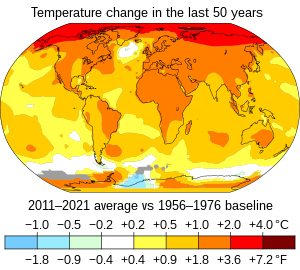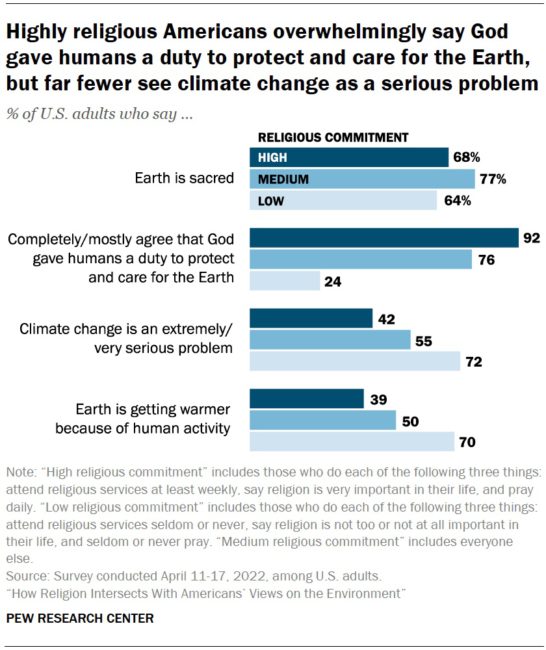
A recent Pew poll has a rather interesting insight into the intersection between Climate Change and religious belief. Their opening pitch is this …
…a solid majority of Christians and large numbers of people who identify with other religious traditions – consider the Earth sacred and believe God gave humans a duty to care for it …
… but …
Well yes, I bet you saw that coming. Christians do have a reputation for quite a few things these days.
So what does the Pew survey reveal?
Well yes, my title is a bit of a spoiler … or is it?
That’s basically the essence of where I’m going with this.
Let’s jump in.
Pew Insights
Pew finds that while the deeply religious might indeed believe they have a sacred duty to care for the earth, they also tend to not really be all that bothered about climate change don’t think it is a problem and that it is not actually happening.
To be clear, that’s the overall trend for the religious. A large number do consider it serious and real. It is a majority that apparently don’t. Not only that, but the more religious an individual is, the more inclined they are to lean into climate change not being real and not a concern.
Here is the Pew illustration of the statistics from their survey …

Why is it like this?
I suspect you can guess.
What is clear is that politics does play the dominant role here.
It is not religion, but instead allegiance to a specific political party that is a far stronger predictor for Climate Change denial. It just so happens that having a specific religious identity is now also part of the right-wing narrative, hence you have people who now identify as “evangelical”, but don’t actually go to any church at all.
Why do some religious people reject the rather robust and well-established scientific consensus regarding climate change?
When asked, these are samples of the answers they presented (the rebuttal is my immediate reaction to the excuse presented) …
- “there are much bigger problems in the world today” … actually no, it really is the greatest challenge our species has ever faced. If you are reading this, then you most probably do appreciate that.
- “God is in control of the climate” … unfortunately, hoping that there will be some supernatural intervention to mitigate our current foolishness is just a fantasy. Weather and climate are not mysterious things that happens by gods doing magic, but are instead well understood.
- “the climate is actually not changing” … literally sticking your head in the sand and muttering “not happening” over and over is very much on par with King Canute standing on the shore and commanding the tide to not rise. Sea level is literally rising at an accelerated rate with each passing year.
Side Note: Canute, king of England, Denmark, and also Norway, (yes, all three at the same time) was not actually stupid, and was not in any way surprised to find his feet getting wet. He was surrounded by sycophants who whispered words that suggested he was omnipotent. The original record of the story explains that he did this attempt to command the tide to not rise to demonstrate to all that his kingly power was rather limited and that they should stop attributing powers to him that he did not have.
OK, back on topic.
Does holding a religious belief cause people to doubt climate change?
I suspect not. What we have here is a correlation and not a causal relationship.
That’s the core of my problem with this poll.
What is also clear from the poll is that there is no consensus. Many who are deeply religious are also deeply concerned about climate change. While on average it is indeed the less religious who are more concerned about climate change, this most probably is all a consequence of the partisan divide.
Is that really the case?
Probably yes.
Remember, at the core of the Christian tradition is the idea that humans are responsible for looking after the Earth. That however conflicts with the right-wing view that it is all a grand hoax, so those sucked into that vortex of disinformation embrace the prevailing mythology in that echo chamber.
Tell me about yourself
The labels we use can be tricky evasive things. What they describe can be very vague.
Pollsters will ask you to identify yourself, and then once they have ticked a box, the answers you provide to other questions will be sliced up into specific religious or political demographics.
There is a fundamental data problem here. Let me illustrate that with an example.
If I asked you to tell me about yourself and in response you told me that you were Catholic, then what exactly are you telling me?
There are many options. Here are a few possibilities …
- You simply had a Catholic upbringing. You don’t actually believe, and you don’t attend Mass
- You do still occasionally attend Mass, not because you believe, but because your friends do and you simply meet them there.
- You believe there might be something but you don’t embrace all Catholic doctrine. You go a couple of times a year at most for the big events such as Easter and Christmas with family.
- You go on a regular basis, but you don’t believe the bread and wine actually become Jesus and that it is only symbolic
- You are deeply committed, attend every week, and sincerely believe it all.
- etc…
And my point is?
If you see a poll that advises you that many Evangelicals or Catholics take the stance on X, then what does that actually mean in the context of the above vagueness of such terms?
There are “Catholics” who use that term because they were brought up that way but don’t actually believe anything and don’t go to Mass. There are Evangelicals who will team you they are “Born Again” but they also don’t go to any church. Instead they have adopted the label because it is tribal and not actually descriptive.
When you slice up survey data using vague wooly terms, such as religious labels or political labels then it crafts survey results that appear to be telling you something, but in the end are a tad misleading.
Bottom Line
Does religious belief cause people to also doubt the prevailing consensus on Climate Change?
I seriously doubt that. It is more about the information bubbles that people get sucked into.
The actual root cause consists of business interests, such as oil and gas corporations, funding disinformation campaigns for many decades.
One Further Thought
It’s still an interesting pew survey, there is much there to mull over. For example they dive into this question – does holding an end-times belief correlate with climate change denial?
If curious go have a read, but be aware, it’s a long article.
(No I’m not being paid to promote them, and no I don’t work for Pew, I’m simply linking to it because its interesting).
